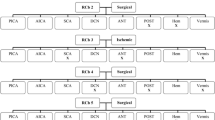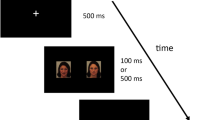Abstract
This study evaluated the use of transcranial Doppler ultrasonography for detecting selective changes in cerebral blood flow velocity during emotional processes. The aim was to investigate the possibility of obtaining functional information on the neuropsychology of emotions in patients with Parkinson's disease (PD). For this reason, blood flow velocity changes were investigated in both middle cerebral arteries (MCA) during a rest condition and when viewing non emotional (tasks 1 and 3) and emotional (task 2) slide sequences. The study included 12 PD patients and 12 healthy subjects. All patients were in treatment with levodopa or dopamine agonist. Investigation of PD patients was performed during an on-phase. The three tasks produced significantly different effects on the right and left side in the PD patients compared with the control group. During the two non emotion-related tasks the increase of mean flow velocity (MFV) compared with the basal values was similar in the two middle cerebral arteries in both groups [(PD Patients: Task 1: left MCA = 3.95 % 2.2, Right MCA = 4.33 % ± 2.3, Task 3: left MCA = 3.04 % ± 1.9, Right MCA = 2.71 % ± 2.2) (control group: Task 1: left MCA = 4.57 % ± 1.4, Right MCA = 4.46 % ± 1.7, Task 3: left MCA = 2.32 % ± 0.9, Right MCA = 2.52 % ± 1.2)] The negative emotional task was accompanied by a significantly higher increase in the right (10.53 % ± 3.2) than in the left middle cerebral artery (4.52 % ± 1.51) only in the control group. The PD patients showed a bilateral and symmetrical increase of MFV (left MCA = 4.28 % ± 2.3 and right MCA 5.77 % ±3.8). To determine whether there was a dysfunction in cerebrovascular reactivity and a deficit in the ability to activate both hemispheres in response to non emotion-related stimuli in the PD patients, the protocol study included a cerebrovascular reactivity test to apnea, a motor task (thumb-to-finger opposition), a cognitive task (word fluency and visual discrimination of objects), performed by both patients and controls. The pattern of MFV changes during these tasks was not statistically significantly different in the two experimental groups. In order to evaluate the possible influence of drug treatment on cerebrovascular reactivity, seven patients were also evaluated during an off-phase, after a 48-hour wash-out period. Changes in MFV during every task were similar to that observed during the on-phase. These findings show the possibility of obtaining specific functional information from bilateral transcranial Doppler and suggest the selective and specific deficit of PD patients in emotional processing.
Similar content being viewed by others
Author information
Authors and Affiliations
Additional information
Received: 23 July 2001 Received in revised form: 28 January 2002 Accepted: 1 February 2002
Rights and permissions
About this article
Cite this article
Troisi, E., Peppe, A., Pierantozzi, M. et al. Emotional processing in Parkinson's disease . J Neurol 249, 993–1000 (2002). https://doi.org/10.1007/s00415-002-0769-2
Published:
Issue Date:
DOI: https://doi.org/10.1007/s00415-002-0769-2




